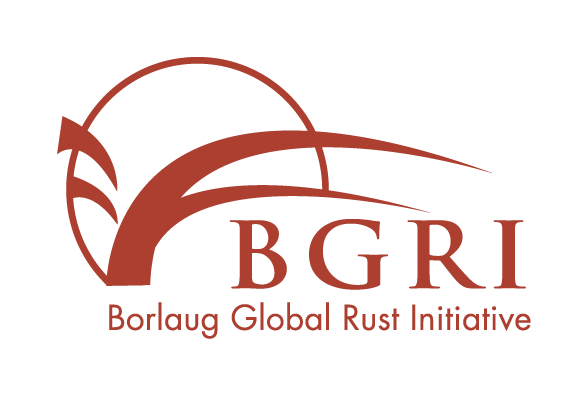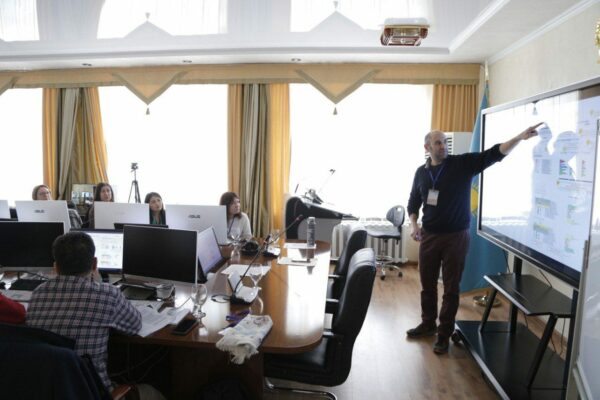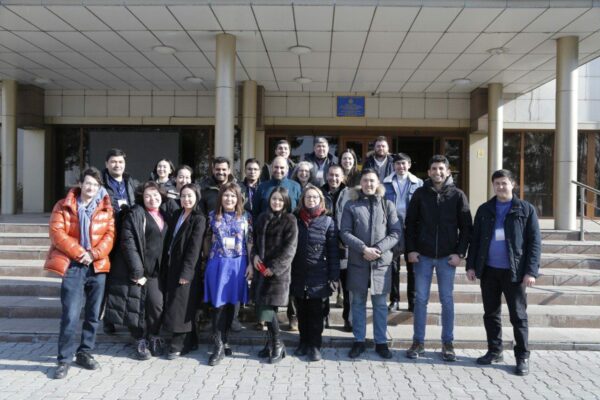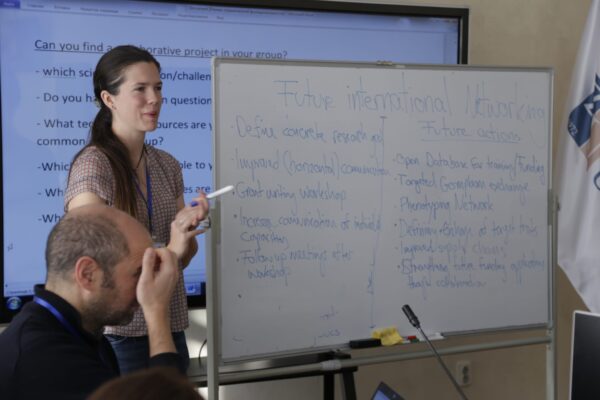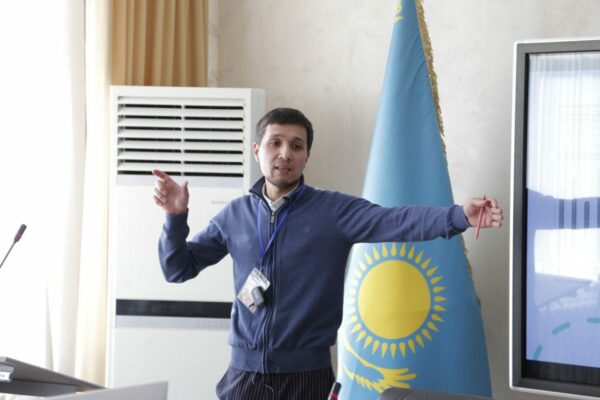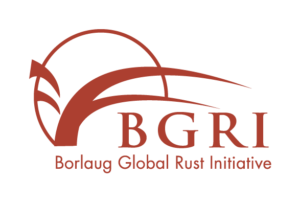For nearly a year, two early-career researchers at the John Innes Centre (JIC) fervently discussed inequalities in access to genetic and genomic tools across the globe.
Anna Backhaus and Kanat Yermekbayev, Ph.D. students at the time, would explore the topic over coffee while looking for opportunities to do something about the issue. When Yermekbayev joined Zhetysu University in Kazakhstan in 2022 to start his own research group, the two saw a chance to put their ideas into motion.
In late January 2023, Backhaus along with two colleagues at JIC set out to provide tools for wheat genetics and genomics in Kazakhstan during a one-week workshop.
The workshop, held at Zhetysu University, aimed to deliver technical training while also facilitating a strong network between the 21 participants from five countries: Kazakhstan, Uzbekistan, Kyrgyzstan, Turkey and Pakistan. The participants work or study in universities, national breeding programs or in CIMMYT programs.
“The diverse background of institutes, countries and career stages of participating scientists became a major strength, a lot of capacity, knowledge and technical support already exists within the region,” said Anna Backhaus, a 2020 Jeanie Borlaug Laube Women in Triticum (WIT) Award winner from the Borlaug Global Rust Initiative. Backhaus led the workshop along with Yermekbayev, with support from JIC professor Cristobal Uauy and Dr Luzie Wingen who accompanied the workshop.
Backhaus noted that the participants were split equally between female and male participants, which she said was excellent to see as female representation in science is high in Kazakhstan.
The workshop was made possible through the support provided by Uauy, Wingen and Dr Simon Griffiths, as well as funding from the John Innes Centre, Zhetysu University, CIMMYT and the BGRI Women in Triticum program.
“It is extremely rewarding to see WIT early career awardees like Anna sharing the scientific and leadership skills with the broader scientific community,” said Maricelis Acevedo, director for science for the BGRI and a research professor of global development at Cornell University’s College of Agriculture and Life Sciences. Acevedo herself earned the WIT award in 2010. “By encouraging and supporting early career scientists to build their own networks of influence and collaboration we increase the impact and sustainability of the BGRI investments in our community.”
2020 Jeanie Borlaug Laube Women in Triticum Early-Career Award
Anna Backhaus
Anna Backhaus, from Germany, earned the 2020 WIT Early-Career Award in part for her research on the genetic network in control of early spike development and trying to understand how developmental decisions are encoded in the wheat genome.
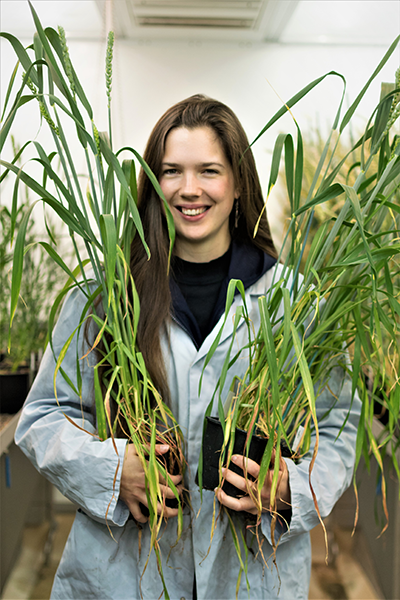
On January 28, the group landed in Almaty in Kaszakhstan, and then embarked on a three-hour drive to Taldykorgan, where the workshop was held. On the way, the group passed snowy plains and herds of livestock.
“Stopping for lunch, we immediately explored the local wheat diversity in the form of fried doughballs, samsa (local dumplings), cheese filled flatbreads that are just like Chilean empanadas, and fresh bread,” Backhaus said
“Hosting training events outside the UK is really important as travelling from other countries can be difficult. Financial and visa-related complications can limit the accessibility and availability of training available at the John Innes Centre, and as one participant commented, ‘As we cannot go to JIC, we invite JIC to come to us’. Many of the tools that we use at JIC are freely available, however, we realized that we only learned about them here, where the communal knowledge of research tools is vast,” Backhaus said. “However we do have a comprehensive suite of online tools available to crop scientists, that are free, easily accessible online and require minimal programming skills. You can find out more about them on the website, www.wheat-training.com.”
Wheat is one of the major staple crops in Kazakhstan. According to Yermekbayev, wheat is a very important export commodity for Kazakhstan, mainly to surrounding Central Asian countries such as Afghanistan, Kyrgyzstan and Uzbekistan. Wheat is cultivated on over 10 million hectares of land but has an extremely short growing season, from April/May until September. The short season is due to the cold winters, which can reach -20 C or lower, and hot summers which don’t allow for much crop growth, according to Backhaus.
“In comparison, UK weather ‘extremes’ are more tame,” she said. “We learned from Kanat that snow plays an important role for agriculture in Kazakhstan. Once the snow melts, the crop is planted in the wet soil and sometimes there is no more rain or irrigation afterwards. Thus, the predicted effects of climate change and the predicted loss of snow and glaciers in the region would have devastating effects on crop yields.”
The workshop delved deeply into wheat genetics. Wingen led the participants through the process of finding new genes linked to phenotypes (known as GWAS).
Wingen conveyed the teachings of this complex topic in a single day. By the end, Backhaus could see Manhattan plots popping up on screens all around the room, which she said was inspiring. Practical sessions like this one formed a vital part of the course to ensure that everyone could perform the analysis and use the tools once back at their home institution.
On the second day of the workshop, Uauy described the latest genomic tools, going from genes to scaffolds, to pangenomes. Participants revised the alphabet of wheat genetics and learned about the complex nomenclature of genes. In the afternoon session, the group discussed the fine mapping of genes, which led to some great chromosome art.
After all the theory, day three and four consisted of the hands-on design of Kompetitive allele specific PCR (KASP) markers, followed by a laboratory practical on KASP.
“The hands-on sessions are really important,” Backhaus said. “Seeing the theory in practice is a vital training step. To our surprise, we were filmed by a national TV station for the news that evening. We hope this will have helped raise awareness of the workshop and the importance of crop research in the region.”
The final day of the workshop included a networking session, where participants actively talked about the need to connect with each other and define some common goals and demands. The resulting summary document is a helpful guide for funding agencies and universities to understand the common needs and goals of the regional scientists.
“The networks and connections formed during the workshop will be a great foundation for new projects, will strengthen future funding applications, and should lead to further knowledge exchange within the region,” Backhaus said.
With support from the WIT program through the BGRI, Backhaus traveled to CIMMYT in Mexico to take part in training and networking opportunities. Those connections proved invaluable, according to Backhaus. “The workshop in Kazakhstan was an opportunity for me to, hopefully, create a similar opportunity for scientists in Central Asia.
“It is extremely rewarding to see WIT early career awardees like Anna sharing the scientific and leadership skills with the broader scientific community.”
Maricelis AcevedoDirector for science for the BGRI and a research professor of global development at Cornell University’s College of Agriculture and Life Sciences
One important message from the workshop was that the collaboration and communication between the institutes in this region and internationally must be strengthened in the future, for example through improved exchange programs, Backhaus said. “After all, the workshop was only created because Kanat, and before that his supervisor, gained scholarships that allowed them to study abroad and establish these links.”
“This workshop has been an outstanding example of what can happen in an institute that encourages collaborations, independence and diversity in early career researchers. The vibrant and interactive community at JIC has led to many great projects and I am sure a few of them have started in the same coffee room.”
The workshop was delivered Cristobal Uauy, Luzie Wingen, Anna Backhaus and Kanat Yermekbayev, and funded by the John Innes Centre, Zhetysu University, CIMMYT and the BGRI Women in Triticum program.
The participants were:
- Aigul Amangeldieva, Kazakh Research Institute of Agriculture and Plant Growing
- Aizhan Zhusupova, Al-Farabi Kazakh National University
- Akerke Amalova, Institute of Plant Biology and Biotechnology
- Daniyar Tajibayev, Kazakh National Agrarian University
- Dilnur Tussipkan, National Center for Biotechnology
- Gulnur Suleimanova, Kazakh National Agrarian University
- Rakhimbek Bektayev, Nazarbayev University National Laboratory Astana
- Ulbike Amanbayeva, Zhetysu University named after I.Zhansugurov
- Zagipa Sapakhova, Institute of Plant Biology and Biotechnology
- Zhuldyz Sartbayeva, Zhetysu University named after I.Zhansugurov
- Bakytbek Imanaliev, Kyrgyz Research Institute of Agriculture
- Abdul Aziz, CIMMYT/Pakistan
- Zaheer Abbas, National Agricultural Research Centre
- Emrah Koc, CIMMYT/Turkiye
- Fatma Betul Sade, Central Research Institute for Field Crops
- Hatice Geren, Aegean Agricultural Research Institute
- Ugur Sesiz, Cukurova University/Sirnak University
- Abdurauf Dolimov, Institute of Genetics and Plant Experimental Biology
- Bakhtiyor Rakhmanov, The Center of Genomics and Bioinformatics
- Doston Erjigitov, Institute of Genetics and Plant Experimental Biology
This article is adopted from a post by the John Innes Centre. You can read the original on the JIC website.
